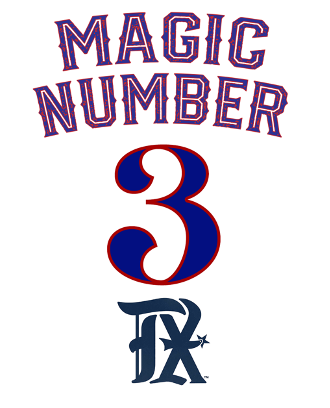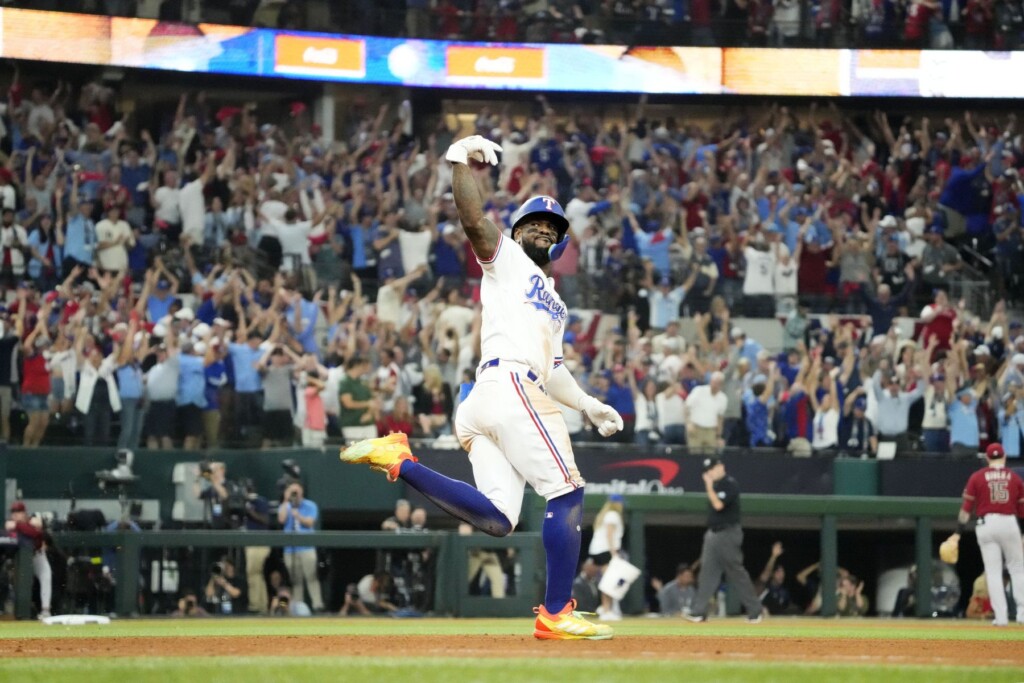Editor’s note: What’s old is new again. Mom jeans are fashionable. Same goes for loafers. You are, at most, three degrees of separation from someone with a variation of a mullet. And the Rangers are back playing October baseball.
So, back for the first time in seven years is Jamey’s Magic Number format. The premise is simple: for however many wins the Rangers have left to capture the World Series, Jamey will write that many items in this column. The Rangers swept Tampa Bay in the Wild Card round, swept Baltimore in the ALDS, took down the Astros in an epic seven-game ALCS, and are now up 1-0 in the World Series after an unforgettable 6-5 win in extra innings, which means that number is now 3. If they take Game 2 tonight, it will drop to 2. And if the Rangers go all the way and, for the first time, finish the deal? Well, that’s the only time you should be excited about a Jamey Newberg column with zero to say (even though you’ll forgive him when he inevitably finds a thing or five to remark upon the World Series trophy finally coming to Arlington).
Let’s have some fun.

Here we go: 3 things.
3. There’s a thing about sports superstition, an altar at which I have faithfully bowed all my life. You can dutifully do your part, wearing mismatched socks or sitting in the same spot on the couch or going to the same Baltimore diner three consecutive mornings. More to the point: you can dutifully ensure you don’t fail to do your part.
But omens live in a different category. You can’t make happen what happens to you. Executing clothing or breakfast choices are matters of free will. But you can’t force an omen. Or choose when it happens. Or make it happen again.
I’d never caught a ball during a big-league baseball game. Only once did a ball come anywhere close to me, and that was on the night of the greatest baseball experience of my life. It was October 22, 2010. The Yankees had just tied Texas in the fifth inning of Game 6 of the first ALCS in Rangers history. Jorge Posada was on second base, and Marcus Thames was at bat. The count was 1-1, as was the score, when Colby Lewis threw a fastball up and in, and the Yankees DH spoiled it, fouling it back.
I wrote this in 2019, thinking back on that moment:
It’s a good way to ditch the nerves, having a ball hit your way. There’s no sound to overcome, no next pitch to sweat, no ominous thoughts to swat away. On the other hand, when you’re plugged into a seat in a packed stadium, the only way to move is up and down. But that, it appeared, would be good enough. Launch angle had given way to descent, and I wasn’t going to have to work my way left or right at all. The pot of gold where the rainbow would end was in Section 25, Row 11, Seat 11.
Some guy to my left and I bumped into each other as the ball neared both of our outstretched hands, and the ball ricocheted off one of our hands, maybe two, and ended up in the grasp of my 6-year-old, Max.
The next few minutes went this way:
Thames strikeout, inning over.
Mitch Moreland single. Elvis Andrus groundout. Michael Young groundout. Josh Hamilton intentional walk.
Vladimir Guerrero two-run double.
Nelson Cruz two-run homer.
Crooked number. 5-1. An hour later: a trip to the World Series.
Back to last night. Same first name (Marcus). Same count (1-1). Tie score (again).
Bottom of the first, minutes after Nathan Eovaldi had made quick work of the Diamondbacks to kick off the World Series. Marcus Semien was up. Ball one, then a called strike. Zac Gallen’s next pitch was well executed, a cutter in the zone but drifting away from Semien’s happy place; he spoiled it, fouling it back. Toward a section higher and farther down the first base line than the one I’d sat in in Game 6 of the 2010 ALCS—the section I found myself sitting in for Game 1 of the 2023 World Series.
Max, now 19, wasn’t with me. He was in Austin watching the game with his college buddies. I turned to my left, my right, behind me, looking for a kid to hand the baseball to. I found one.
The next few minutes went this way:
Semien groundout.
Corey Seager walk.
Evan Carter double caromed at 106.7 mph off the wall in right center.
Adolis Garcia 116-mph liner powered to left field on a gorgeous 9-degree launch angle.
Crooked number. 2-0. Nearly four hours later: an epic, unforgettable, World Series-opening win.
For much of the night, specifically when the Rangers found themselves behind during the third through eighth innings, I was a little concerned. If the omen meant Texas would take leads in innings in which I caught a baseball but would not in the innings in which I didn’t, that didn’t bode particularly well for the night or the series. That’s lots of pressure to repeat. Not exactly socks to choose from the drawer or game-planning the walk to Miss Shirley’s.
Speed, the signature feature of the Arizona attack, played big. Alek Thomas easily beat out a chopper over Eovaldi’s head, and, three batters later, Corbin Carroll took advantage of Leody Taveras’ indecision in center field to triple Thomas and Evan Longoria home. One batter later, Carroll would score himself on a 102-mph grounder from Ketel Marte, perhaps aided by Nathaniel Lowe’s hesitation. The Diamondbacks stole four bases, putting pressure on the Rangers all night in ways the Rays, Orioles, and Astros didn’t. That’s going to remain a major storyline in this series.
It’s a good thing they revoke the zombie-runner rule in the playoffs. It’s easy to imagine that if the Diamondbacks were able to start the 10th inning with Carroll parked on second base, the game might have never gotten to the 11th.
But it did.
In the largest crowd ever to pack in for a game at Globe Life Field, one inconsequential baseball found me—strictly speaking, that is. I will forever own the stupid idea that it was quite consequential.
The baseball that ended up in Max’s hand 13 years ago and now sits on a bookshelf, and the one that ended up in another kid’s hand last night and surely sits on his shelves this morning—those led to crooked numbers that broke a tie, in games that ultimately ended in indelibly monumental Rangers victories.
Games that now sit alone as the two greatest I’ve ever been on hand to experience.
2. Not that I’m the one to thank for this. Sure, we all do our part. But there were slightly more material performances.
After the game, MLB requested that the Rangers send Seager, Eovaldi, Garcia, and Bruce Bochy to the interview room. All four—some prompted, some not—made sure to credit the bullpen for their work, without which the game is never put squarely in Seager’s hands in the ninth. The quintet of Dane Dunning, Cody Bradford, Jon Gray, Will Smith, and Jose Leclerc—all, aside from Leclerc, lightly used this month—was masterful: 6 1/3 scoreless innings, two hits (one an infield single), zero walks, six strikeouts, and a crisp 84 pitches with an exquisite 70 percent strike rate.
Those 19 outs amount to a line that would stand out for any starting pitcher in the game.
Seager was the first to make all that yeomen’s work worth celebrating. He used the Arizona gameplan to his advantage, accepting a walk in the first (and then scoring on Carter’s double), accepting another walk in the third (and eventually scoring on Mitch Garver’s own patient, eight-pitch walk), and, of course, providing a moment that will populate his career highlight film.
The 29-year-old has played 164 games at Globe Life Field, including not only this postseason but also the NLDS, NLCS, and World Series as a Dodger in 2020. In what is roughly the equivalent of a full major-league season, he is a .308/.385/.642 hitter (1.027 OPS) with 55 home runs and 126 RBI. Pretty, pretty good.
And the last two of those runs batted in? Man.
Taveras drew a hard-earned walk off Arizona closer Paul Sewald to lead off the ninth, laying off two pitches early in the count—one narrowly up and another barely away—to set the stage for the top of the order. Sewald had Semien in swing mode, fanning him on three pitches. Seager was up, with the Rangers down two runs and down to their last two outs.
After the game, Diamondbacks manager Torey Lovullo would chalk up what happened next as “big-time players do[ing] big-time things in big-time moments.” He also admitted that between the end of the game and the postgame presser, he sat down with members of the front office debriefing the decision to pitch to Seager with Garver on deck and Austin Hedges in the hole.
“If I’m sitting there as a Monday-morning quarterback, I’m thinking about it now,” Lovullo added. “But I was thinking with a very clear head. Make pitches, bring our closer into the game, and we’ll get a couple of outs here and march off the field. That was my mindset.”
Seager’s mindset was different. Maybe the most formulaic first-pitch hitter in baseball stuck to his approach as he stepped in with an 0-for-8 career line against Sewald.
The closer’s first pitch to Seager was also his last.
It came in at 93.6 mph. It went away at 112.6 mph—418 feet away.
Seager’s reaction, especially in the context of the stoic demeanor that is emblematic as his first-pitch appetite, was everything. It was a storybook moment for a player who is so uncommonly good at baseball that it takes a whole lot to qualify as storybook.
Speaking of storybook, you’re reading this on StrongSide—but you may also later be reading it in a book. More on that in due time.
1. Seager’s heroics rocked Globe Life Field into a pandemonium that, half a day later, still rings in my ears. (Good thing it was as loud as it was; I shouted things probably unsuitable for that kid I’d handed the ball to eight innings earlier to hear, if any of us could hear anything besides a massive roar.)
But, amazingly, the bedlam would get a reprise.
Right after Seager’s blast, Carter struck out, and, on an 0-2 pitch, Sewald came inside on Garcia and drilled him on the left hand. There were no theatrics; only the bated breath of 42,000-plus, exhaling when his slow walk with trainer ended at first base rather than peeling off into the home dugout.
His stolen base seconds later was predictable but probably not very smart. Arizona made the obvious move; if Garcia were to score, the game would be over, so putting Garver on intentionally had zero downside. And plenty of upside: it brought the very light-hitting Hedges up. Bochy could have hit for him—he had Robbie Grossman on the bench, for instance—but that would have meant Garver sliding to catcher and the pitcher moving into the Grossman spot for however long the game lasted.
Hedges swung through three straight sweepers, stranding Garcia and Garver.
Both teams went scoreless in the 10th and Leclerc pitched a second clean frame in the 11th.
Carter, left in to face lefty Kyle Nelson to start the bottom of the 11th, lobbed a lazy flyout to right. It brought Garcia up, and reliever Miguel Castro in. He’d face Garcia once last year and once this year, getting him out both times, once on strikes.
A Castro slider sailed to the screen and Garcia spit on a second straight pitch, a changeup low and away. He then swung through another change before successfully taking yet another one. The count was 3-1, and Castro hadn’t thrown Garcia a fastball. Yet.
The 6-foot-7 righty fired a 97-mph two-seamer down in the zone.
I get sort of carried away, you might have noticed, with the adjustments Garcia has made lately, and I asked Bochy a question after the game that I would have asked him if it were just the two of us sitting down for a beer, or breakfast at Miss Shirley’s.
Given Garcia’s flair for the big moment and his emotional game, how big is it for him to stay within himself, let a pitch like that get deep, and take it the opposite way?
“He’s done such a great job with that,” Bochy replied. “We saw [it] in the last series, we saw [it] toward the end of the season. He’s doing such a great job controlling his emotions, so to speak, where he’s not overswinging and he’s staying under control. That’s fun to watch when he does that.”
Garcia hammered the low fastball the other way, powering it to right field on a gorgeous 25-degree launch angle and depositing it not only into the seats but also into Rangers postseason lore, and his own. It was his fifth consecutive game with a homer.
He now has 22 RBI in this postseason, an all-time MLB record that breaks the mark set by the Cardinals’ David Freese in, uh, 2011. On an 11th-inning walkoff home run in a World Series game featuring the Rangers.
Garcia, a former Cardinal himself …
… knocked Freese out of the record books with his own 11th-inning walkoff job. On the 12-year anniversary of Freese’s, obviously at a horrifically low moment for this franchise.
I don’t know if Garcia deleting Freese is another omen. But I do know that it’s going to take some doing to make me question the power of the omen at this point.
Author







